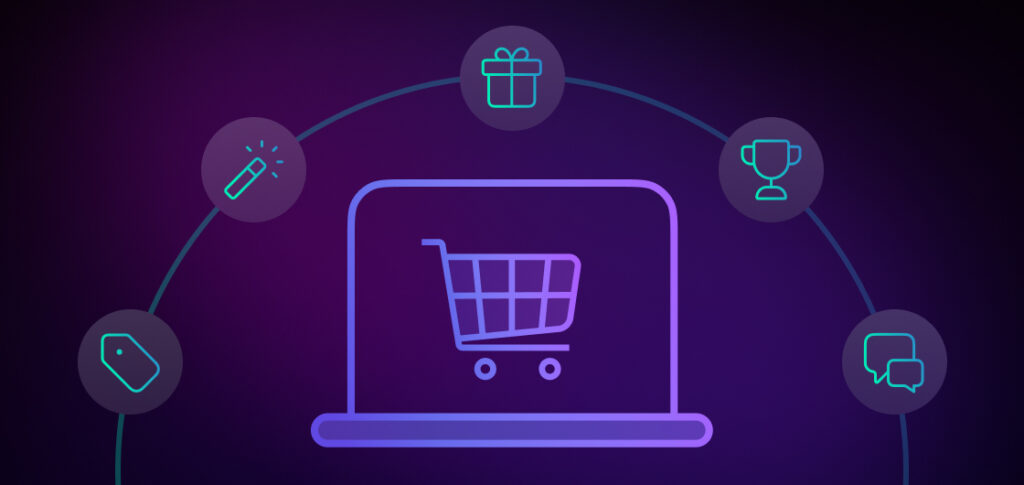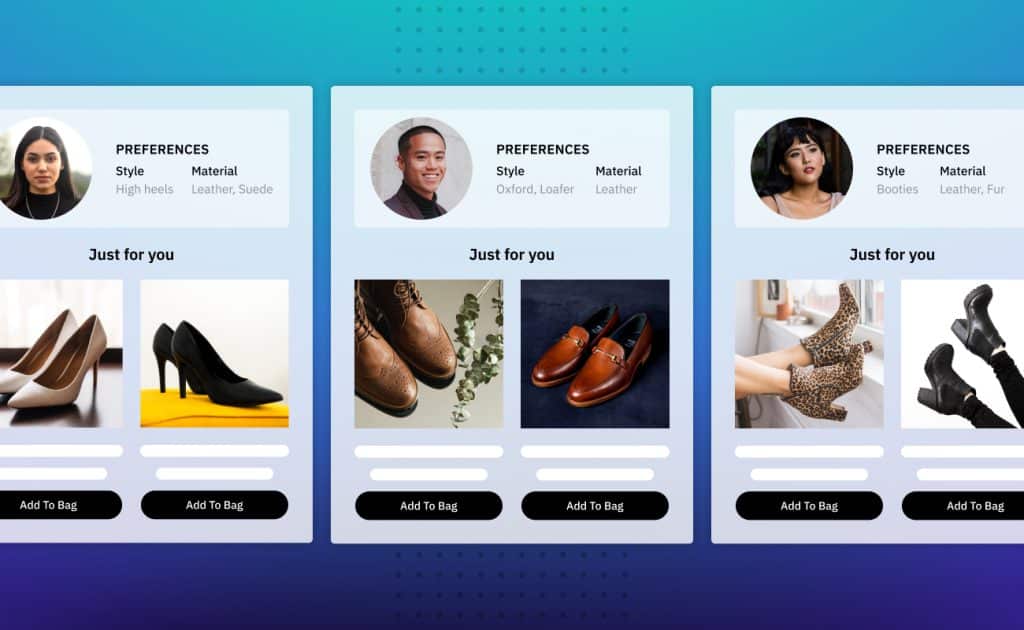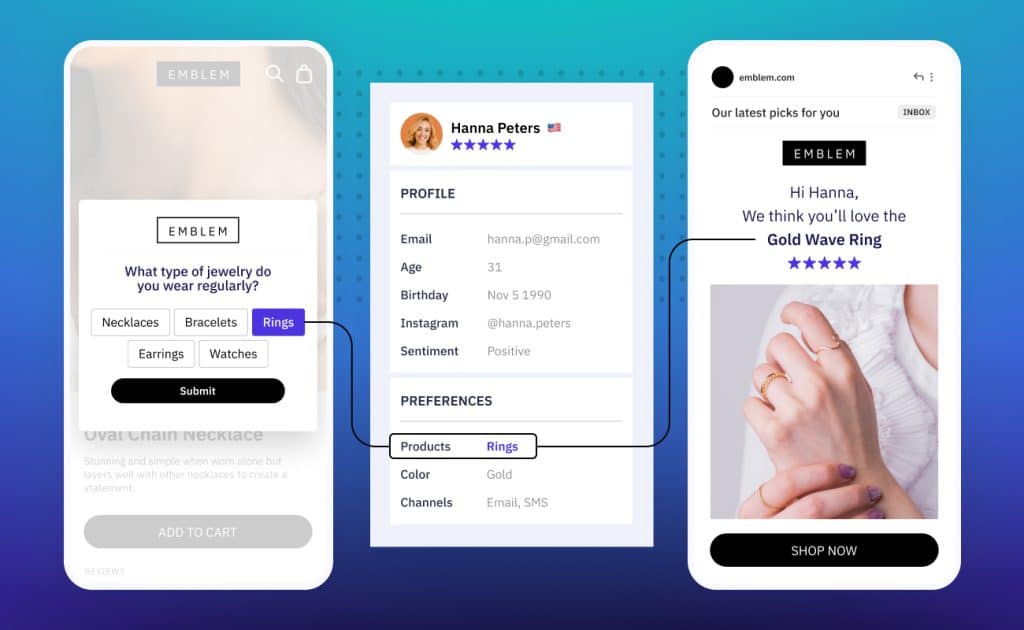
- Customer Experience
- Customer Loyalty
- Customer Marketing
- Customer Retention
- Ecommerce Marketing
- Loyalty
The Biggest Ecommerce Trends to Follow in 2025 (According to the Experts)
Megan Wenzl | Dec 2, 2024
Mar 9, 2023 | 5 minute read

Lindsay Kolinsky
Director of Marketing
When customers visit your Shopify store, they want to feel like they’re shopping with a brand that knows them. In fact, 80% of shoppers are more likely to make a purchase if a company has adopted a personalized approach.
In today’s ecommerce world, personalization takes on many forms. From custom ads for repeat visitors, emails with product recommendations based on browsing history, and website content that is tailored to the interests of specific customers, there are many ways to personalize your offering to your customers.
And the truth is, aside from meeting customer expectations, personalization has a bottom-line impact as well. In fact, according to McKinsey personalization can drive a 10-15% increase in revenue.
Reinforcing personalization’s value, David Mulgrew, Director, MindArc notes: “Personalization is an essential part of any successful ecommerce strategy. A personalized shopping experience can increase customer engagement, bump up average order value, improve customer satisfaction and ultimately boost sales. It also provides valuable insights into your customers’ profile giving you a competitive advantage.”
As personalization continues to grow as a key differentiator for ecommerce brands of all shapes and sizes, let’s take a closer look at some of its biggest benefits.

With customer acquisition costs (CAC) continuing to soar, brands are constantly looking for more cost effective ways to attract new customers. That’s where a personalization strategy that’s deployed across channels can be a powerful tool. Simply put, personalization allows brands to go from casting as wide of a net as possible, to targeting the right individuals at the right time and drawing them in by establishing relationships built on an understanding of their unique needs and interests.
However, the truth is that if finding new customers is your sole marketing strategy, chances are you’re throwing money into the wind. Afterall, it can cost up to five times more to acquire a new customer than it does to retain an existing one.
The good news is that a multi-channel personalization strategy can also help with customer retention. Consider a Shopify store that sells stylish home-office equipment and furniture. Thanks to a personalized ad campaign, a new customer finds the store and purchases a desk. In doing so, they create an account with the store and sign up for email and SMS communications.
A few days later, the customer receives an email notifying them of items and accessories for their desk. The customer browses through the email and takes particular interest in an office chair, but for budget concerns, they don’t make a purchase.
The following day, thanks to analytics that reveal the customer’s browsing history, the Shopify store sends the customer a one-time 20% discount offer that can be used on any office chair in the store. The customer uses the coupon and buys the chair.
In this example, personalization has enabled the store to retain the customer and drive a repeat purchase in a way that doesn’t require a significant marketing spend.
It’s simple — the more you focus on personalizing your offerings in a consistent manner, the more your customers will trust you. And with 95% of consumers saying that trust is a factor in deciding what brands to do business with, trust is in many ways becoming the new ecommerce currency.
Today’s customers are more discerning than ever when it comes to how and where they spend their money. If they don’t trust that you genuinely care about their individual needs and preferences then they’ll find someone else who will.
Incorporating personalization elements throughout your Shopify store and marketing strategy ensures that you are communicating with your customers in relevant and authentic ways, rather than simply taking a spray and pray approach to selling products. And with greater trust comes loyalty, something that is more important than ever in an environment where your customers have seemingly endless options to find the products and services they need.
When companies personalize their campaigns, offers, and promotions to their customers’ tastes, they’re more likely to see higher conversion rates. Why? These interactions are based on a true understanding of customers’ interests and needs, and highly actionable insights such as browsing history and purchase habits.
Because they’ve already expressed interest in the types of products or services you offer, you just need to give them a little nudge to get them to the checkout page.

In today’s privacy-centric landscape, you may think that appearing in someone’s inbox or on their phone screen with an offer will come off as spammy and be quickly ignored. But that’s only the case if it’s done in an impersonal way.
In fact, one study found that nearly 50% of shoppers report having made an impulse purchase after receiving a personalized email or other communication from a brand. Perhaps even more promising is the fact that 40% of consumers say they have purchased something more expensive than planned because their experience was personalized.
These statistics show how the right level of personalization can not only lead to more purchases, but more money spent on the orders you receive.
While establishing and running a Shopify store comes with a tremendous amount of opportunity — including expanding your audience to all corners of the world — there’s no doubt that it has its own unique set of challenges.
For starters, the competition can be fierce. Today’s ecommerce brands are competing against countless other merchants, some of which have an extensive reach. To make your store stand out from the rest, it’s crucial to take your customer relationships to the next level. And just as in our daily lives, building stronger relationships necessitates a personal approach.
Personalization can benefit your Shopify store in many ways, from helping you maximize your budget, increase trust and loyalty, boost average order value, and establish a better brand-to-consumer connection. By taking a personalized approach to your marketing, you can create a more engaging and memorable shopping experience that will keep your customers coming back for more.
Related articles
Ready to learn more?